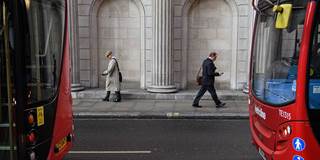Edouard-François de Lencquesaing, the president of the European Institute of Financial Regulation, recently dismissed London’s post-Brexit prospects as a global financial center, calling the City's rise “a mere accident of history.” But some accidents have enduring consequences, and the consequences of this one are not going away.
BERKELEY – Only now, as we approach the third anniversary of the United Kingdom’s referendum on membership in the European Union, are the implications of leaving the bloc finally sinking in. One indication, amusing to those with a taste for black humor, is the marketing success of Brexit survival kits containing a water filter, fire-starting equipment, and enough freeze-dried food for 30 days.
Another indication is the launch, at the end of January, of a parliamentary inquiry into London’s prospects as a financial center. This investigation is a response to prominent financial firms voting with their feet. Goldman Sachs, JPMorgan, Morgan Stanley, and Citigroup have moved nearly $300 billion of balance-sheet assets from London to Frankfurt, and Barclays has won approval to move another $215 billion to Dublin. BNP Paribas, Crédit Agricole, and Société Général have transferred 500 staff from London to Paris. HSBC has shifted ownership of many of its European subsidiaries from the UK to France.
Anxiety is heightened by uncertainty about the post-Brexit regime. Prime Minister Theresa May’s government entered negotiations confident of obtaining passporting rights – authorization to provide services throughout the EU without the further approval of host-country regulators – for UK banks. But had it looked more closely, her government would have seen that the EU has granted a non-member passporting rights only when the country – Norway, for example – belonged to the European Economic Area.

BERKELEY – Only now, as we approach the third anniversary of the United Kingdom’s referendum on membership in the European Union, are the implications of leaving the bloc finally sinking in. One indication, amusing to those with a taste for black humor, is the marketing success of Brexit survival kits containing a water filter, fire-starting equipment, and enough freeze-dried food for 30 days.
Another indication is the launch, at the end of January, of a parliamentary inquiry into London’s prospects as a financial center. This investigation is a response to prominent financial firms voting with their feet. Goldman Sachs, JPMorgan, Morgan Stanley, and Citigroup have moved nearly $300 billion of balance-sheet assets from London to Frankfurt, and Barclays has won approval to move another $215 billion to Dublin. BNP Paribas, Crédit Agricole, and Société Général have transferred 500 staff from London to Paris. HSBC has shifted ownership of many of its European subsidiaries from the UK to France.
Anxiety is heightened by uncertainty about the post-Brexit regime. Prime Minister Theresa May’s government entered negotiations confident of obtaining passporting rights – authorization to provide services throughout the EU without the further approval of host-country regulators – for UK banks. But had it looked more closely, her government would have seen that the EU has granted a non-member passporting rights only when the country – Norway, for example – belonged to the European Economic Area.